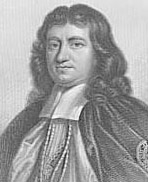Clan Burnett People
 Gilbert Burnet (1643 – 1715)
Gilbert Burnet (1643 – 1715)
Scottish theologian and historian, and Bishop of Salisbury. He was fluent in Dutch and French, Latin, Greek, and Hebrew. Gilbert was respected as a cleric, a preacher, and an academic, as well as a writer and historian.
He was born at Edinburgh, Scotland in 1643, the son of a Royalist and Episcopalian lawyer, who became a judge, and of the sister of Johnston of Warristoun, a leader of the Covenanters. His father was his first tutor until he began his studies at the University of Aberdeen, where he earned a Master of Arts in Philosophy at the age of thirteen. He studied law briefly before changing to theology, and earned his Doctor of Divinity by the age of eighteen. He did not enter into the ministry at that time, but traveled for several years. He visited Oxford, Cambridge, London, the United Provinces and France. He studied Hebrew under a Rabbi in Amsterdam. By 1665 he returned to Scotland and was ordained by the Bishop of Edinburgh.
He began his ministry in the rural church at Saltoun, East Lothian, and served this community devoutly for four years. In 1669, without his asking or even consent, he was named to the vacant chair of Divinity at the University of Glasgow. At first he declined, since his congregation unanimously asked him to remain. But, when Bishop of Edinburgh Leighton urged him, he accepted the post.
With the unsettled political times, he left the University in 1674 and moved to London. In London, his political and religious sentiments prompted him to support the Whigs. His energetic and bustling character led him to take an active part in the controversies of the time, and he endeavoured to bring about a reconciliation between Episcopacy and Presbytery. Going to London he was in some favour with Charles II, from whom he received various preferments.
His literary reputation was greatly enhanced by the publication in 1679 of the first volume of his History of the Reformation of the Church of England, for which he received the thanks of the Parliament of England, and which was completed by other two volumes, in 1682 and 1714. For over a century this was the standard reference work in the field, although Catholics disputed some of its content.On account of a letter of reproof which he ventured to write to the King, he lost favour at Court, and the policy pursued by James II being very repugnant to him, he betook himself in 1687 to the United Provinces, where he became one of the advisers of the Prince of Orange. Returning to the Kingdom of England, he was made Bishop of Salisbury, which office he adorned by liberal views and a zealous discharge of duty.
The work by which his fame is chiefly sustained, his History of my Own Times, was, by his direction, not to be published until 6 years after his death. It appeared in 1723. It gives a sketch of the history of the English Civil War and the Commonwealth of England, and a detailed account of the immediately succeeding period down to 1713. While not free from egotism and some party feeling, it is written with a sincere desire for accuracy and fairness, and it has largely the authority of an eye-witness. The style, if somewhat lacking in dignity, is lively and picturesque. The strength of this work was such that it has had modern (although abridged) reprints as The History of His Own Times. Among his other writings are a History of the Dukes of Hamilton, and an Exposition of the 39 Articles.





